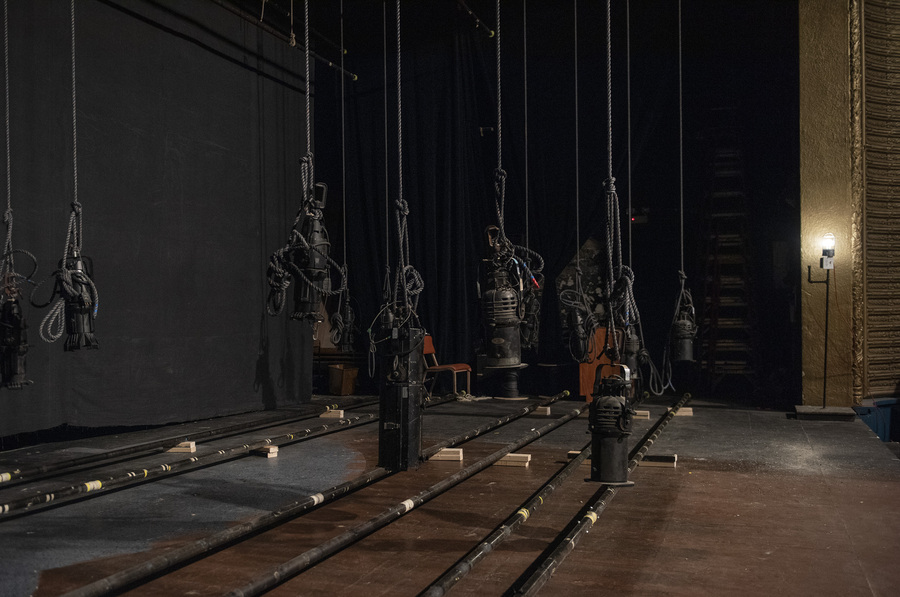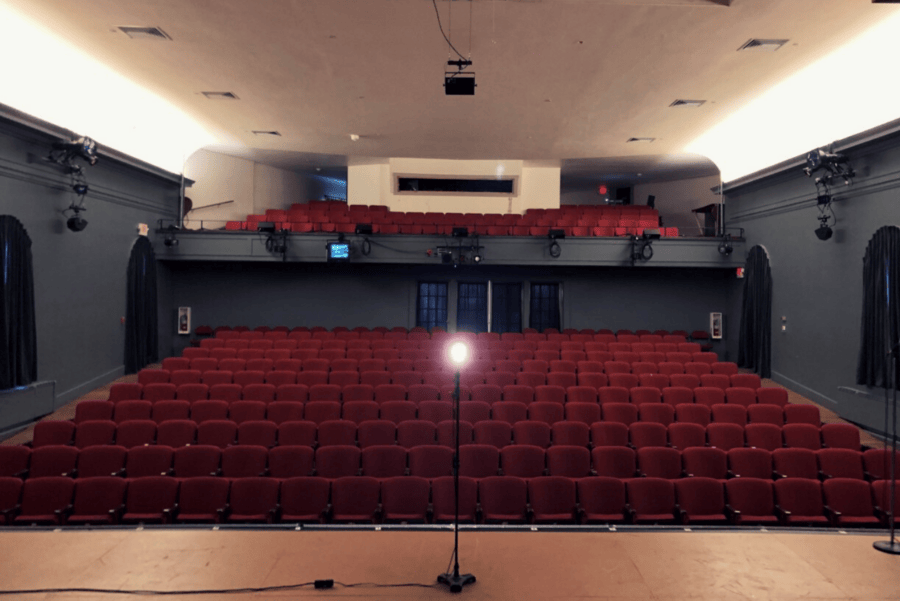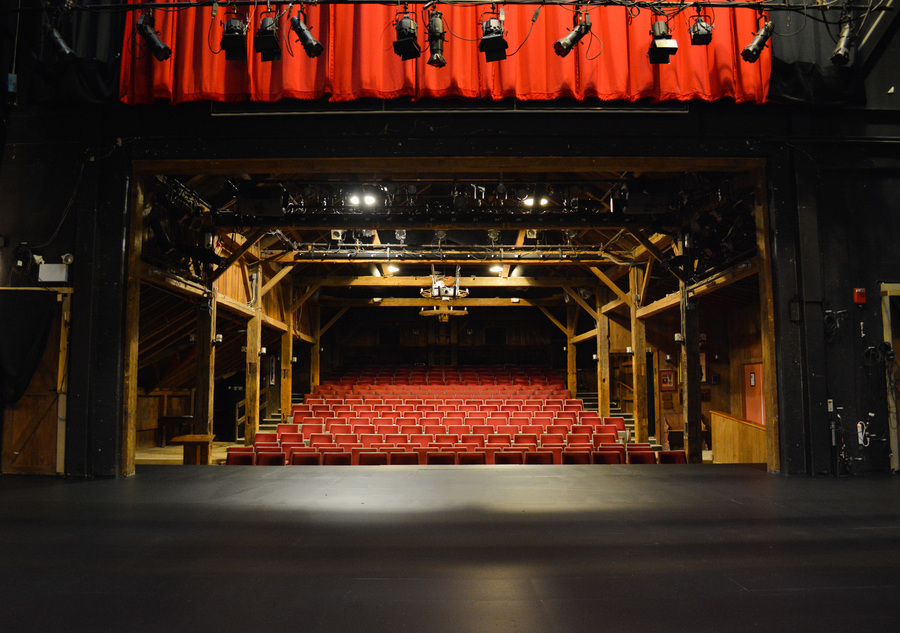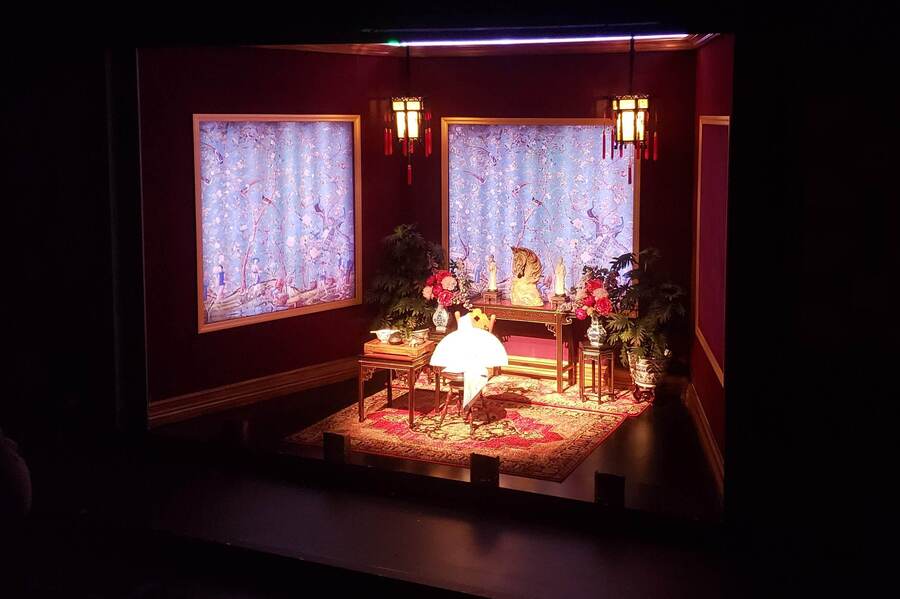Like many theatres around the country amid the pandemic lockdown, New England’s theatres are weighing plans for an uncertain economic future with the urgency of addressing the Black Lives Matter movement and opposing systemic racial injustice. At the intersection of these defining disruptions is a moment for self-examination of the work these theatres do institutionally, artistically, and altruistically for their communities. I spoke to four companies about their canceled seasons, shifts to virtual programming, and movement toward an anti-racist future for theatre as a whole.

When I checked in with Penobscot Theatre Company in May, it had only recently closed its doors, canceling the season and furloughing about half of its staff. Now, weeks into the shutdown, producing artistic director Bari Newport has found a point of hope for what the future holds.
“I feel a little bit more optimistic with what we’re doing,” she said. “We’ve only recently determined that we’re going to go forward with an extremely small season of one-person plays.” This modified season will be a mixture of productions online, live, and a combination of the two, depending on what state restrictions allow.
An innovative initiative taken on by the theatre was inspired by, of all places, Airbnb. Newport said she was inspired by the virtual experiences Airbnb has been offering online, and after taking part in a few, she and other company staff decided to create their own. A particularly enjoyable sangria-and-drag experience helped spark two virtual programs: “Dishin’ in Drag With Dominick,” hosted by actor Dominick Varney, and a kid-focused program put on by the director of education Ben Layman. A virtual ghost tour of its historic opera house is also in the works.
Penobscot Theatre will also move forward with their Dramatic Academy, including the Northern Writes Jr. playwriting contest, according to Newport. The contest challenges youths throughout the state, ages 4 to 18, to write original plays between two and 10 minutes long. Fifteen of these submissions will be selected to be produced next spring.
Another ongoing project has been a multi-year National Endowment of the Arts grant focused on dramatizing the life of Molly Spotted Elk, a famed actress and member of the Penobscot Nation. Two years in, the theatre’s goal is to be able to fully produce this work, titled Molly Spotted Elk: A Penobscot in Paris, within the next two years. Newport says the theatre has really put focus on its namesake, the Penobscot Nation, over the last eight years, creating collaborations, connections, and access to its theatrical resources for the Indigenous nation. One such project is 2016’s Transformer Tales: Stories of the Dawnland, an original work produced after a year-long collaboration among the theatre, the Penobscot Nation, educators, scholars, and other local resources.
Newport spoke frankly about how the theatre is responding to the civil unrest and addressing the longstanding racial injustice in the country as well as in the theatre industry.
“Maine is 98 percent white,” she said. “Bangor is .01 percent black. That doesn’t let us off the hook. What we have done is really focus on the disenfranchised people in our community,” she said, by facilitating the conversations and partnerships that will create more equity on the stage, she continued. “We’ve tried to really focus on our namesake. I want to do it right, I want to do it well, I want to do it deep. And all of that takes time and capacity and ongoing work.”

The Weston Playhouse Theatre Company, in the town of Weston, Vt., should be well into its regular June-to-October summer season. The shutdowns happened during its more modest winter programming, with one program still in progress when the cancellation was announced. “On March 14, we canceled the final show of that series,” said Susanna Gellert, executive artistic director of the playhouse. “In some ways, we were very lucky because we weren’t in the throes of our full season and had to cancel what amounted to a couple of events. But while that was all going on, we were in the thick of getting ready to have artists and theatremakers arrive for the summer season.”
For Gellert, who is midway through her second year with the company, this would have been her first season launch. The shutdowns have been disappointing, but Gellert is happy to have not had to lay off or furlough any of her small full-time staff thanks to a small loan that the theatre received. It was also important for Gellert that the company do its best to pay the artists who had been doing work in preparation for the season.
After the company officially announced the cancellation of the 2020 summer season on April 2, Gellert had hopes to still have some form of live theatre available. Windsor County, where the theatre is located, is on the low end of infection rates in the state, she said. “It’s also probably one of the most lacking in healthcare infrastructure,” Gellert continued. “So we’ve decided to be really cautious about opening our doors.”
Instead of a live season, the Weston Playhouse team got creative in addressing programming, launching a “micro-commission” project. It reached out to artists to write new plays for online production, with selected works to be produced professionally. The website states the importance of this project in both creating new works and being able to pay writers, actors, and directors during these difficult economic times.
Gellert said she sees this project, and theatre in general, as a means to amplify and give voice to the issues of racial injustice and violence in our country. The playhouse put out a statement on June 1 acknowledging that while the theatre has a long history of doing social justice and equity work, it has come up short and has issues that need to be addressed.
“When I think back not only a month ago or a year ago but years ago, artists have been telling us these things for a while,” Gellert said, adding that the new commission project has resulted in submissions powerfully capturing this critical moment in our country, including the murder of George Floyd. “I’ve been really inspired not only by the bravery and honesty of that, but by the artists who are putting that into an artistic forum.”

The first week of June would have been when staff returned to Peterborough Players in Peterborough, N.H., for the summer 2020 season. Managing director Keith Stevens is feeling this loss acutely, noting that the day we spoke, June 5, was to be the first day of rehearsals for its first two productions.
The 87-year-old company puts on seven mainstage shows—as well as two second company shows for children—between June and September, and it is the culmination of efforts for all the productions as opposed to any single show that Stevens loves the most.
“It’s hard for me as managing director to say, ‘This is the one I really wanted to see,’ because they’re all ones I really wanted to see,” he said. “And I wanted to see how the company grows from their first day through the season. I wanted to see how the audience grows from the first day through the end of the season.”
With the summer season cancelled, the company is looking toward a winter season as the next possible option for live performances. According to Stevens, the Players have put on a small number of productions for their community and members over the last four winters, with positive response. All this will depend not only on what the company is allowed to do but on what its community is willing to experience, with the health and safety of people on both sides of the curtain considered.
For now, the Peterborough Players continue to take things slow. The company has not delved too deeply into virtual programming, but did air “Peterborough Players Backstage (from Home) Party,” celebrating what would have been the company’s opening night on June 17. Recorded and starring a group of company performers, this free event was billed to be “a little like if a Zoom cocktail party and a talkback had a baby,” with each performer joining in from the safety of their own home. There is also an ongoing series called Bright Spots, for which Peterborough Players record video check-ins, available to view on its webpage. The theatre itself is quiet without the usual influx of seasonal staff, interns, company actors, and residents, and though the company had avoided layoffs for its small year-round staff, some recent temporary furloughs were made.
With both the pandemic and the surge of protests in support of #BlackLivesMatter creating questions of the role of theatrical institutions in their communities, the company is looking inward as to how to move forward. Peterborough Players issued a statement of support on June 2 and has used the time since then to be introspective.
“What we as an institution need to do is look at the things that we have been doing,” Stevens said. “Look for how we can improve, look for how we can become strong allies, look for how we can become more inclusive—not just in a numbers way but in how we run the business. Whatever we end up committing to do, we have to commit to do. Whatever action steps we’re going to say we’re going to do, we need to know we’re going to do them.”

When the staff of Long Wharf Theatre left their offices the week of March 16, tech rehearsals for its fourth production had just started. Rehearsals for the final production were only two weeks away. The cancellation was difficult, yet the theatre felt supported by its community and audience. “Since we canceled, we have really seen a lot of generosity,” said managing director Kit Ingui. “A little more than 50 percent of our audience members are donating their tickets back to us. It was really positive to see, especially in this economic climate, that folks are making the decision to still leave their money with us.”
The theatre also saw an outpouring of a support for its gala, which took place June 8. The reformatted fundraising event went virtual, complete with a concert featuring Broadway stars and regional performers alike. The biggest impact of the night was the number of supporters in attendance: The 408-seat theatre usually creates a capacity limit for events, but going virtual opened the doors to numbers it was not expecting. Instead of around 400 attendees, Ingui said, it was more like 1,400.
Though the shutdowns put a halt to its final two shows, the theatre has proactively announced the focus for its next season, and it is one with collaboration, partnership, and equity at its core. “Because of COVID-19, and also because of the civil unrest, it just feels like this is the moment to really turn over the company, both philosophically but also in a real programmatic way to the community,” said artistic director Jacob G. Padrón. “To figure out how those lessons, and what we discover with the community, can actually help to shape future programming and the future life of long work.”
Long Wharf has a longstanding commitment to its role as a socially conscious theatre, and the partnerships—both existing and in process—are intended to strengthen and deepen this work. One example is a 2015 “Violence in Our Community: In Search of Understanding and Empathy” event that, along with the Community Foundation for Greater New Haven and other community members, addressed the issues of violence within the New Haven area. In a letter to the community acknowledging the institutional racism and ongoing violence against the Black community, Padrón and Ingui recognize that while the theatre’s values as an organization align with the Black Lives Matter movement, there is more work the organization needs to do to uphold their mission. One way they’ve identified to do this is by focusing both on the ability for arts and activism to amplify one another, and on the power to create access to these within their community.
“This was work that we have started,” Ingui said. “Jacob’s vision for not just Long Wharf, but honestly for the potential of the American theatre, is this idea that art and activism should live side by side, and that that’s how we create change in the world. That’s what our power is, right? Our change-making power.”
Sarah Tietje-Mietz is a Goldring Arts Journalism graduate student at Syracuse University.
Creative credits for production photos: The Chinese Lady by Lloyd Suh, directed by Ralph B. Peña, with set design by Junghyun Georgia Lee, lighting design by Jiyoun Chang


